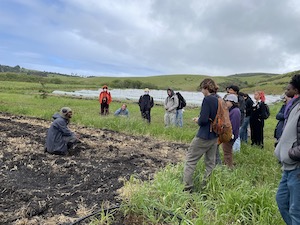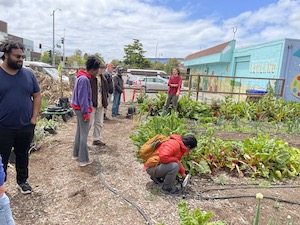A grant of $100,000 from the UC Santa Cruz Center for Coastal Climate Resilience (CCCR) Pilot Funding Initiative will support a Center for Agroecology research trial on biointensive no-till practices for micro farms and urban gardens. The goal of this pilot project is to investigate no-till organic cultivation as a climate-smart strategy for small-scale growers raising vegetable and fruit crops.
The project, led by UC Santa Cruz-based Organic Production Specialist Joji Muramoto, will bring together a team of researchers and experienced growers to explore the impacts of no-till organic growing on hand-worked plots ranging from less than an acre to five acres (micro farms). The pilot will initiate long-term research plots at the UCSC Farm and Chadwick Garden to support investigations by partner organizations on no-till micro farms in the region.
This research builds on a recent survey by Muramoto of no-till micro farms in the state, as well as a previous five-year Gordon Family Foundation-funded study on the potential of no-till organic practices in the region. This work will build off of event-related research at UC Berkeley and informal studies by the Community Alliance for Family Farmers.
“It is exciting to learn from this farmer-developed, grassroots practice,” said Muramoto. “We'll establish a trial at each of our gardens: the Alan Chadwick Garden and Farm Garden. It will be interesting to see how much of a difference this practice will make in carbon sequestration at these sites, which have been managed organically using tillage-based methods for more than 50 years.”
Undergraduate students will be involved at every stage of the project, from planting to data collection, engaging in meaningful work to explore strategies for climate resilience and food security at a time when climate anxiety is rising. This research will also support integration with the Center’s USDA-funded program to scale organic agriculture across the UC system. The Center is leading this effort, supporting UC Davis, UC Berkeley, and UC Agriculture and Natural Resources (UCANR) to integrate Black, Indigenous, and people of color (BIPOC) and underrepresented students into organic research projects across the campuses.
There are well-documented benefits of no-till systems in commodity crops (corn, soy, cotton, wheat) helping to ameliorate climate change through the transformation of soil properties and farm practices such as increased water holding capacity, decreased fertilizer applications, and decreased diesel fuel use. However, these systems are reliant on synthetic herbicides for weed control and there has been very little work done to adapt these systems for organic vegetables and fruits.
There have been even fewer studies on small farms practicing no-till in hand-worked systems or with only small implements. If these systems are productive and can sequester carbon as purported, they could present a serious opportunity to combat climate change. Through this research, the Center for Agroecology aims to explore low-cost, reduced-labor growing methods that will help limited-resource, diversified growers on small acreage become more climate resilient.


